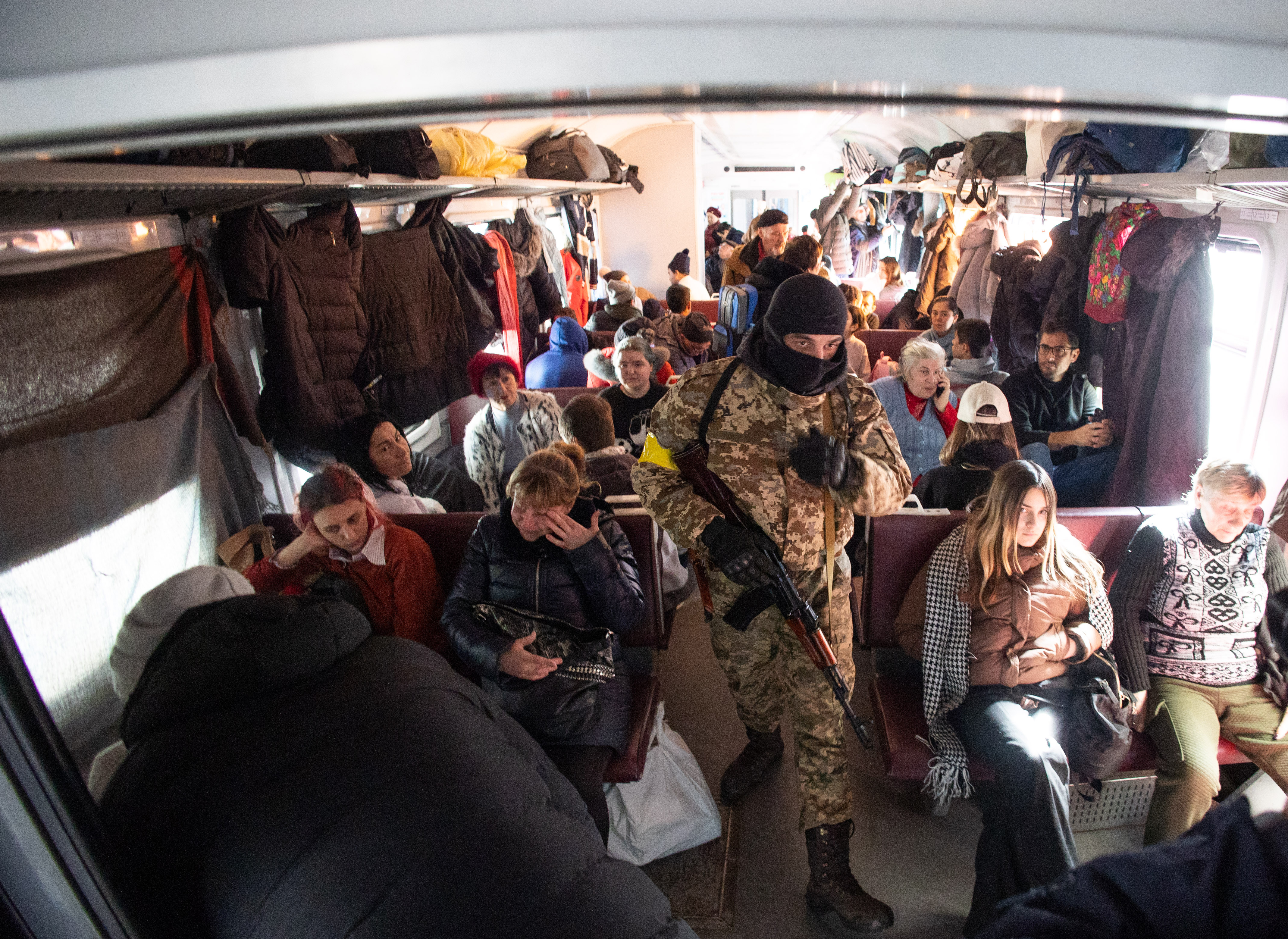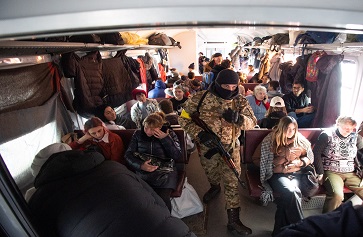UCLA audience hears insights about war from Ukrainian professor as rockets fall
The president of the Kyiv School of Economics joins discussion live from Ukraine’s capital

Kyiv, Ukraine: 11 March, 2022 – People in the evacuation train at the railway station in Kyiv — Photo by Fotoreserg
With occasional interruptions from nearby sirens warning of incoming rocket fire, Tymofiy Mylovanov, president of the Kyiv School of Economics, joined a rapt online UCLA audience to share his on-the-ground insights about Russian President Vladimir Putin’s invasion of Ukraine.
“Daily, people are dying,” said Mylovanov, who joined UCLA professors Daniel Treisman and Rob Trager for a discussion from his Kyiv office, where he is organizing humanitarian assistance for his students stranded in Russian-occupied areas.
“We are deeply grateful to [Mylovanov], and we hope that he and his family are keeping safe,” said Trager, an associate professor of political science, who served as moderator and extended messages of solidarity from the UCLA community.
The discussion, part of the UCLA political science department’s “U Heard It Here” lecture series, had nearly 1,000 viewers during its live stream and opened with remarks from Darnell Hunt, dean of social sciences in the UCLA College, and an introduction from Michael Chwe, chair of the political science department.
During the 90-plus–minute talk, Mylovanov, who also teaches economics at the University of Pittsburgh, pleaded for increased military intervention from the European Union and NATO.
“It would be great if the EU and North America would consider no-fly zones,” he said. “We should act if we feel that something is wrong. It’s our fundamental human obligation.”
Mylovanov also clarified what he sees as inaccurate reporting, disputing the narrative that Putin’s invasion is succeeding. He said that equipped with weapons from Western allies, Ukrainian forces have provided a formidable resistance.
After Mylovanov’s opening remarks, Trager began to introduce Treisman but was interrupted by Mylovanov and the sound of a rocket-warning siren.
“Guys, I’m sorry, I have to evacuate. There is an attack coming,” said Mylovanov, as a voice speaking in Ukrainian was heard over a loudspeaker delivering directions. Then, silence.
Trager continued the program by recognizing the enormous difficulty of having a discussion with someone in mortal danger.
“First, I want to start by saying just how humbling it is to be here today with Tymofiy,” said Treisman, who praised Mylovanov for his dedication to his students and his country before launching into a geopolitical history of the region.
Treisman, who has met with Putin and edited the 2018 book “The New Autocracy: Information, Politics, and Policy in Putin’s Russia,” said Putin’s decision to invade Ukraine was driven by ideological nationalism and a spurious need to “de-Nazify” the country and prevent it from joining NATO.
“Putin was being given exaggerated accounts of support for Russia within Ukraine … support for an invasion,” said Treisman, who thinks Putin miscalculated the effectiveness of the Ukrainian resistance, the Western response and how the invasion would be viewed by the Russian public, many of whom have demonstrated against the unprovoked military action against a sovereign state.
Treisman pointed to Putin’s recent house arrest order for Sergey Beseda, head of the foreign service for the FSB —Russia’s intelligence agency, the successor to the KGB — which Treisman sees as an obvious sign of Putin’s frustration.
Trager opened up the floor with discussion prompts, asking what a Russian victory would look like, what it would take to break Ukrainian will and what a global escalation might amount to.
With Mylovanov still unable to join, Treisman answered those questions, using a historical context to frame his idea of a Russian victory — Russian military rule in Ukraine — before going on to say that he doesn’t foresee Ukraine capitulating or Putin pulling back.
“This will inevitably result in more deliberate bombings of civilian areas,” said Treisman, who thinks Putin will terrorize the Ukrainian people to advance the war on his own terms.
Treisman said another theory is that Putin might give in to Western pressure and propose Russian withdrawal to the Donetsk and Luhansk regions in the east, keeping Russian territorial gains in the south of Ukraine, along the coast, as a land bridge between the two eastern republics — which Ukraine does not recognize — and Crimea. Even still, Treisman doubts Ukraine would accept such terms.
Treisman then addressed the dilemma around Mylovanov’s plea for NATO-enforced no-fly zones in Ukraine and what it would mean for the West to be in conflict with a nuclear power such as Russia.
“Perhaps less focus on NATO no-fly zones because it’s probably not going to happen,” said Treisman, making sure to preface his answer by saying he is not a military expert but thinks there are alternatives that would help with air defense short of Mylovanov’s request — such as helping Poland provide Ukraine with fighter jets and supplying advanced anti-aircraft systems.
A brief interjection from Chwe relayed the message that Mylovanov had been instructed by authorities to cut power and continue sheltering but that he planned to rejoin the call as soon as he could.
Upon rejoining, Mylovanov speculated about how the war might end.
“If we don’t resolve this issue with the aggressive Russian military power, then they’ll just be more emboldened, and we’ll be having more panels where I say, ‘I told you so,’” he said.
Next, Trager posed questions to the panelists from the chat about the likelihood of nuclear weapons being used by Russia. Treisman pointed to a Russian doctrine stipulating that tactical nuclear weapons can be used only if foreign forces attack Russian territory.
“If the doctrine is not something Putin feels constrained by, then all bets are off,” said Treisman, who thinks that if Putin goes to this extreme, he would not only face crushing economic sanctions, but he would also destabilize things to the extent that he would have no friends, including China.
Mylovanov then challenged the narrative: “These are exactly the kind of questions he wants us to wonder about,” he said. “The question [instead] is how to minimize his offensive and aggressive capability.”
Treisman agreed.
“We have to help Ukraine defeat Russia in this war. It’s not just a war about Ukraine. It’s a fight about the future of the world.”
The Kyiv School of Economics, together with Ukrainian businesses and state-owned companies, launched a humanitarian aid campaign for Ukraine. Tymofiy Mylovanov, who is on the ground in Kyiv and heading the effort, is currently asking for donations for medical kits.
This article originally appeared in the UCLA Newsroom. For more news and updates from the UCLA College, visit college.ucla.edu.


 Photo by Fotoreserg
Photo by Fotoreserg UCLA Geography Aerial Archives
UCLA Geography Aerial Archives Keith Schengili-Roberts/Wikimedia Commons
Keith Schengili-Roberts/Wikimedia Commons